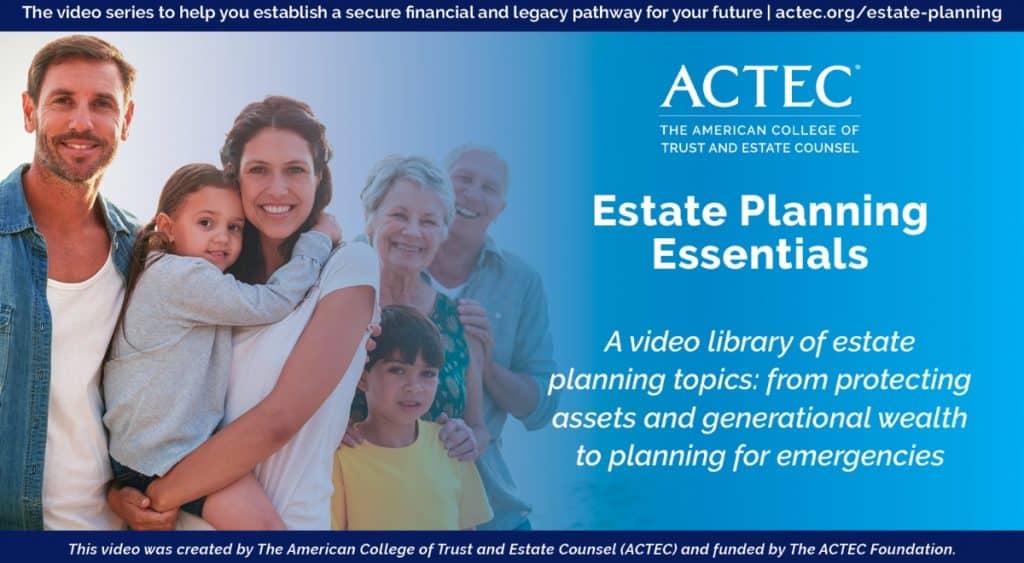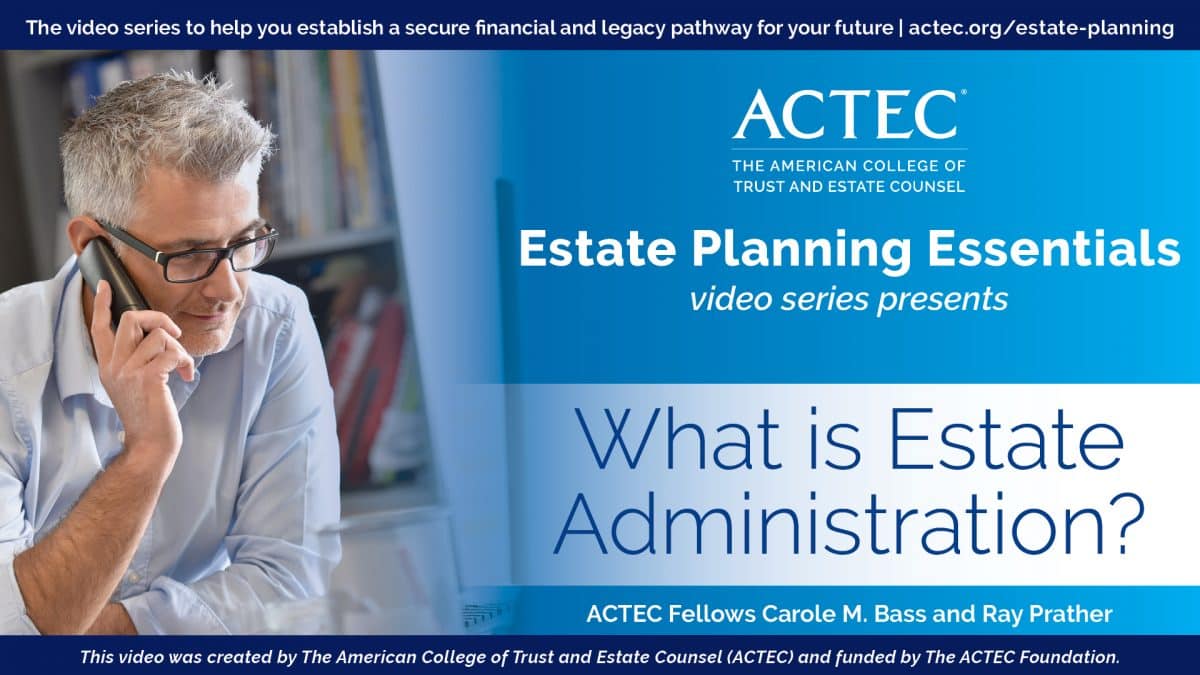Estate tax returns are legal documents filed with the government after an individual’s death to report the total value of their estate, including assets and liabilities, for tax assessment purposes. These returns are used to calculate any estate tax owed, with the tax liability based on the estate’s net value, the applicable tax rates and exemptions in effect at the time of the individual’s death.
ACTEC Fellows Adam M. Damerow and Tye J. Klooster provide a step-by-step overview of the estate tax preparation and filing process, including what clients need to know about the estate tax return, the extension, the exemption, and the IRS timeline for closing.
Transcript
Hi everybody, Tye Klooster here, ACTEC Fellow from Chicago. I’m joined today by Adam Damerow, also an ACTEC Fellow from Chicago and we’re going to be talking about estate tax returns. Adam, the first question I have for you is, what is an estate tax return?
Thank you, Tye. An estate tax return is a return that a decedent’s family would file upon the passing of the taxpayer. Much like an income tax return, an estate tax return is filed with the IRS and on the estate tax return the family will outline all of the decedent’s assets, which he or she owned at the date of death, as well as the value of them. So essentially, it’s a balance sheet providing a snapshot of the decedent’s assets and values at the date of death. That would include real estate, the bank accounts, stocks and bonds accounts, closely held investments, insurance, retirement accounts, really anything the decedent owned. Even tangible personal property would be included on the return.
Got it. And when are you required to file an estate tax return?
An estate tax return is generally due 9 months after the decedent’s death. So, 9 months after the date of death. Like other tax returns, it may be extended automatically. There’s an automatic 6-month extension so it could be filed, and often is filed, fifteen months after the date of death, because it takes a lot of time to collect information and report. However, if tax is due, the tax is due and payable after 9 months and failure to pay the tax within 9 months could result in the IRS accessing penalties and interest.
Now, not every decedent needs to file an estate tax return. Very few do. You only file a return if your estate is over the applicable estate exemption in the year of death which, in 2021, is 11.7 million dollars. The estate tax return also looks at prior lifetime gifts. So, if somebody gave away 5 million dollars during their lifetime, that would have used up some of their estate exemption, so at death, they would only have 6.7 million remaining available to shelter assets. So, if a person makes 5 million in lifetime gifts, and dies with 7 million dollars of assets, they’re over the 11.7, so they must file a return.
Now, like I said, not everybody has that kind of wealth and so very few taxpayers in the US file estate tax returns. There is a circumstance where the surviving spouse would want to file an estate tax return to make a portability election for the predeceased spouse to grab their unused exemption. There’s another video on actec.org which talks about portability in detail.
Got it, Adam. So, what you’re saying is that you have to pay attention to the gross asset value of the decedent at death, add back gifts, and if those two numbers exceed the filing threshold that’s in existence for that particular year, right now it’s 11.7 million (2021), then there’s an obligation to file an estate tax return.
Could you clarify the timing? When is that return due; and when is the tax due? Just clarify that.
The return is due 9 months after date of death, unless extended. Then, with the 6-month extension, it is due fifteen months after date of death. The tax however if any is due must be paid 9 months after date of death.
So, a client dies and you’re working with the family and other advisers on the estate, what types of information are you typically requesting from the family and advisers to help you complete this estate tax return?
We need some general background information on the decedent, most of which is available on the death certificate. Really, the meat and potatoes of the return is the inventory of the decedent’s assets; listing out every account, every financial asset, every investment and providing a valuation of them. It’s pretty easy to go to a bank and get an account statement for a checking account or brokerage account in the month of death. You can figure out what the decedent owned on the date of death.
For real estate, family businesses, family farms you have to undertake an appraisal and have a third-party appraiser typically attest to the value of those closely held assets for which there’s no public market. So, in working with the family, the outside and other advisers, appraisers, CPA and the financial institutions, we collect all this information so that we can report the assets, as well as the deductions, such as mortgages, on the return which would help reduce the overall estate and potentially reduce the tax.
What’s the process of hearing back from the IRS? How long does it typically take? Do they send you a notice? Do you have to log into a system and figure out if they’ve accepted your return is filed? What’s the basic system for hearing back from the IRS?
There has been some changes in the past couple of years in how the service processes them. Pre-COVID they were processing them in probably 6 to 9 months. Now, after COVID, I just had one that took 18 months to find out the estate was closed. The taxpayer affirmatively, or their advisor, needs to go to the Service and either get a tax transcript or request a closing letter in order to find out if the Service has accepted the return, as filed, and have assurances that there will not be any audit of the information presented.
Okay, great! With that our presentation has come to an end. I want to thank you for your time. I hope you found this information on estate tax returns valuable.
Featured Video
What is Estate Administration?
Estate planning attorneys explain what is involved in estate administration, the duration, distributions of assets, and what happens if there is no will.
ACTEC Estate Planning Essentials

ACTEC Fellows provide answers to frequently asked trust and estate planning questions in this video series.



